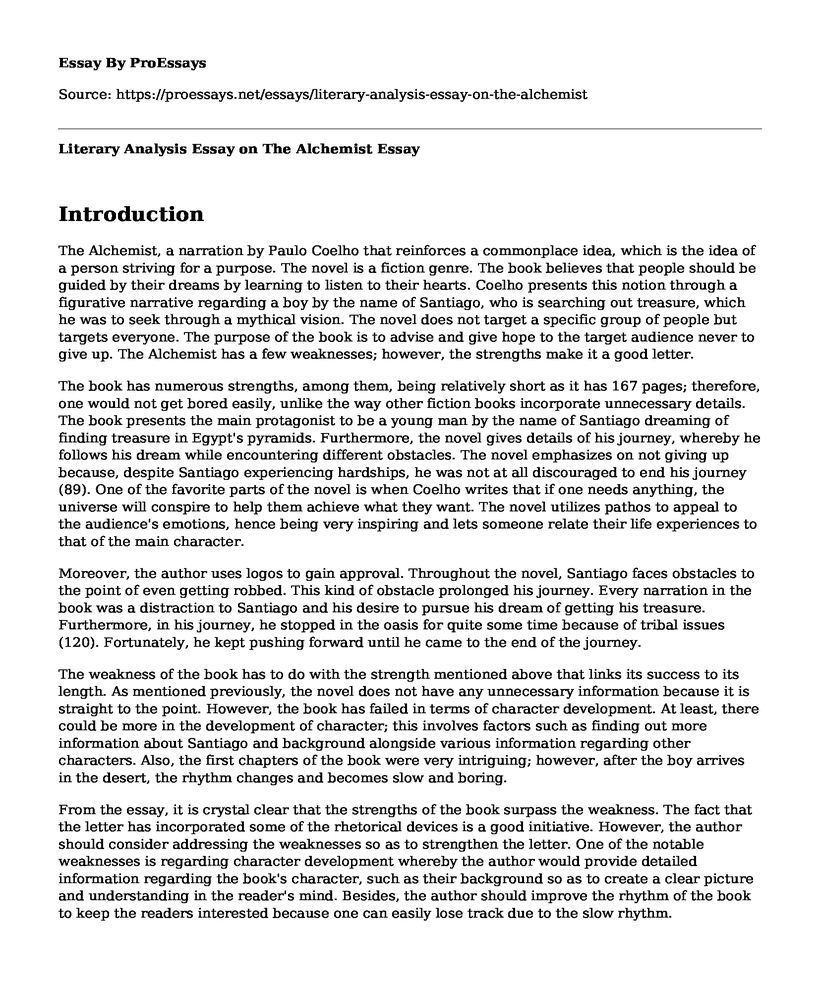Introduction
The Alchemist, a narration by Paulo Coelho that reinforces a commonplace idea, which is the idea of a person striving for a purpose. The novel is a fiction genre. The book believes that people should be guided by their dreams by learning to listen to their hearts. Coelho presents this notion through a figurative narrative regarding a boy by the name of Santiago, who is searching out treasure, which he was to seek through a mythical vision. The novel does not target a specific group of people but targets everyone. The purpose of the book is to advise and give hope to the target audience never to give up. The Alchemist has a few weaknesses; however, the strengths make it a good letter.
The book has numerous strengths, among them, being relatively short as it has 167 pages; therefore, one would not get bored easily, unlike the way other fiction books incorporate unnecessary details. The book presents the main protagonist to be a young man by the name of Santiago dreaming of finding treasure in Egypt's pyramids. Furthermore, the novel gives details of his journey, whereby he follows his dream while encountering different obstacles. The novel emphasizes on not giving up because, despite Santiago experiencing hardships, he was not at all discouraged to end his journey (89). One of the favorite parts of the novel is when Coelho writes that if one needs anything, the universe will conspire to help them achieve what they want. The novel utilizes pathos to appeal to the audience's emotions, hence being very inspiring and lets someone relate their life experiences to that of the main character.
Moreover, the author uses logos to gain approval. Throughout the novel, Santiago faces obstacles to the point of even getting robbed. This kind of obstacle prolonged his journey. Every narration in the book was a distraction to Santiago and his desire to pursue his dream of getting his treasure. Furthermore, in his journey, he stopped in the oasis for quite some time because of tribal issues (120). Fortunately, he kept pushing forward until he came to the end of the journey.
The weakness of the book has to do with the strength mentioned above that links its success to its length. As mentioned previously, the novel does not have any unnecessary information because it is straight to the point. However, the book has failed in terms of character development. At least, there could be more in the development of character; this involves factors such as finding out more information about Santiago and background alongside various information regarding other characters. Also, the first chapters of the book were very intriguing; however, after the boy arrives in the desert, the rhythm changes and becomes slow and boring.
From the essay, it is crystal clear that the strengths of the book surpass the weakness. The fact that the letter has incorporated some of the rhetorical devices is a good initiative. However, the author should consider addressing the weaknesses so as to strengthen the letter. One of the notable weaknesses is regarding character development whereby the author would provide detailed information regarding the book's character, such as their background so as to create a clear picture and understanding in the reader's mind. Besides, the author should improve the rhythm of the book to keep the readers interested because one can easily lose track due to the slow rhythm.
Work Cited
Coelho, Paulo. "The Alchemist." (2014).
Cite this page
Literary Analysis Essay on The Alchemist. (2023, May 15). Retrieved from https://proessays.net/essays/literary-analysis-essay-on-the-alchemist
If you are the original author of this essay and no longer wish to have it published on the ProEssays website, please click below to request its removal:
- A Literary Essay Example: Chivalric Ideals Pursued by Don Quixote
- Poetry Analysis Essay on "Embrace" by Billy Collins
- How Does Terrance Hayes Challenge or Expand the Sonnet Form? Essay
- The New Prometheus: Depictions of the Romantic Hero in Mary Shelley's Frankenstein
- Essay on Comparing "Pet Sematary": Original vs. Remake
- Macbeth: An Exploration of Remarkable Character Evolution Through Political Ambition - Essay Sample
- Essay Sample on Hero: A Symbol of Courage, Nobility, and Achievement







